Ladies and Gentlemen,
We gather here today to reflect upon the life and legacy of Jimmy Carter, the 39th President of the United States, who passed away at the age of 100. As we honor his memory, it is crucial to examine some of the less celebrated aspects of his presidency, particularly his strategic decisions that have had lasting, albeit controversial, impacts on global geopolitics.
President Carter’s tenure included a pivotal moment in foreign policy with his administration’s decision to support the Mujahideen in Afghanistan during the late 1970s. This policy, encapsulated by Operation Cyclone, was not merely an act of countering Soviet expansion but a catalyst for decades of conflict, transformation, and the reshaping of international relations. By providing covert aid, including arms and training, to various Afghan factions opposing the Soviet-backed government, Carter inadvertently set the stage for the emergence of extremist groups. This support was instrumental in drawing the Soviet Union into a quagmire that would contribute significantly to its eventual collapse. However, the unintended consequences were profound.
The bolstering of these groups, notably the Mujahideen, sowed the seeds for the Taliban and other radical factions. The rise of these entities led to a prolonged period of war, not just within Afghanistan but influencing regional and global security dynamics for years. The vacuum left by the Soviet withdrawal was filled by these very forces, leading to civil unrest, the War on Terror, and continuous military engagements in the region.
Carter’s actions enhanced America’s geopolitical leverage during the Cold War but at a significant cost. The expansion of this conflict meant a substantial increase in the influence of the military-industrial complex. Defense contractors thrived as the demand for military hardware, intelligence, and logistical support skyrocketed. This era not only solidified U.S. military might but also entrenched a culture of militarization that shaped American foreign policy for decades.
Imagine an alternate history where Carter did not authorize this support. The Soviet Union might have faced less resistance in Afghanistan, potentially altering the course of the Cold War. Perhaps the world would have seen less of the radicalization that has plagued regions from Central Asia to the Middle East. Without these wars, the military-industrial complex might not have grown to the extent it did, possibly leading to a different focus on domestic issues, environmental concerns, or even global peace initiatives.
Carter’s legacy, thus, is complex. While he is remembered for his commitment to human rights and his peacemaking efforts like the Camp David Accords, his administration’s involvement in Afghanistan underscores a darker side of realpolitik. His decisions catalyzed a chain reaction of conflict, but also arguably secured America’s position as a superpower in the post-Cold War world.
We must remember President Carter not just through the lens of peace but also through the lens of the wars that his policies helped initiate. His legacy challenges us to consider the long-term implications of our actions on the global stage. Without his work, the tapestry of world history might have been woven quite differently, possibly with fewer threads of conflict but also without the subsequent shifts in power that have defined the modern age.
In closing, let us honor Jimmy Carter by acknowledging the full spectrum of his influence, recognizing that even the most well-intentioned policies can lead to unforeseen and far-reaching consequences. His life teaches us the importance of foresight, the complexity of leadership, and the enduring impact of decisions made in times of peace and war.
Thank you, President Carter, for a legacy that compels us to reflect deeply on the paths we choose.




